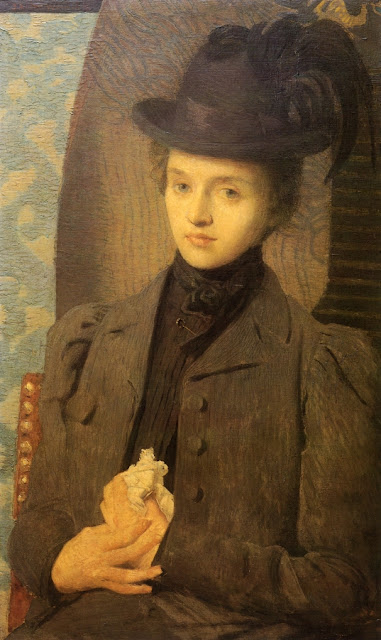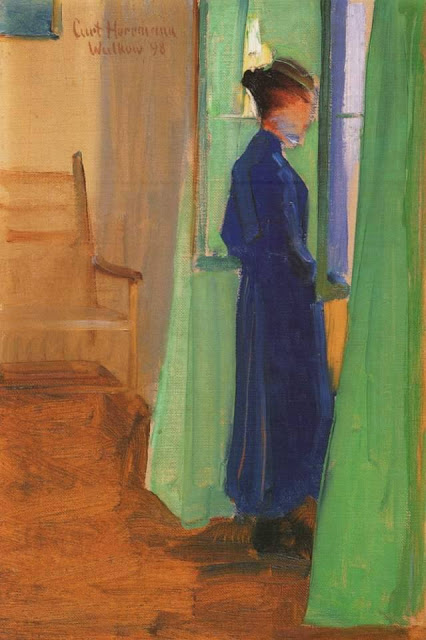published 1924
[Old Mr Herbert and Canon Jocelyn used to travel together in Europe as young men. Now his friend’s son has come to visit the Canon: ]
Mr Herbert said his father had told him of Canon Jocelyn and a certain beautiful Grand Duchess.
‘Yes, the Princess Sophia did me the honour of accepting the roses I had the temerity to offer her. That was all the bright sunshine of morning, and now it is twilight, and one sees the grave beauty of the approaching night.’
Mary could not help a twinge of indignation. She wondered which had been the bright sunshine of her morning. Had not her life been rather the twilight of a river mist, or even of a London fog? And there had been years... when she, too, might have been gay. Common sense... came to her aid. Her father must have been born suited to Grand Duchesses, and she, with all the pushing in the world, would never have suited Grand Dukes.
It is far from Grand Dukes and Duchesses that the rest of this book is placed, (the protagonists live in the imaginary village of ‘Dedmayne’ for goodness sake), and they do not feature again: this is a strange fleeting moment, but still it gives a hint of the book’s charms. I thought this was a funny and sad moment, nicely expressed. It shows the relentlessness of Mary’s low self-esteem, her awful life, and her occasional moments of questioning.
I first read this book in 1988 and remembered little about it – just that it was the kind of book it sounded like from the title. I also read The Third Miss Symons, same author. When moving house and discarding books, I took both down and re-read them. I didn’t like Miss Symons at all, tiresome and predictable, and stuck in its own world, and I expected the same of this one and was ready to skim and give up, but it sucked me in and I was compelled by it – I looked forward to picking it up, and wanted to know what was going to happen. Even though
SPOILER
it was not going to be anything good.
The structure is strange, and there is an awkwardness about the writing. Mayor writes beautifully about the lives and loves of her characters, but on a sentence by sentence basis she can be strange and muddled. The action jumps around, clumsy groups of words abound on every page.
None of that matters, and nor does the fact that at times you would cheerfully strangle Mary for her ridiculous ways: but still it is hard to describe what is so good about the novel. Mary is the daughter of a clergyman: the two of them (remnants of the family) living together in a small village in East Anglia. Her father is remote and comfortless: a clever man with no emotional side. Mary does her best, but feels unloved by him. Eventually a new vicar comes to a nearby village, who gives hope to Mary (and others who see how suitable he would be). But she is not destined for happiness
SPOILER
He marries someone else, but she is still forever stuck with the couple, forced to enter into their marital problems and try to help them.
Nothing ever goes right for her: she doesn’t get a coming-out dance, her father refuses to make the tennis court ready for parties, she starts classes in the village and they fail, she manages to be highly offensive to someone who might have helped get her poems published. Mary is endlessly and ruthlessly snubbed ignored and disliked by everyone except the servants and some rather vague ‘villagers’ – occasionally we are reminded that they loved her. Nothing much happens, the misery just goes on and on. Even when it looks as though she will have some free life of her own, she ends up having to live with another relative.
And yet – it won’t be to everyone’s taste, but I found the book magnetic, and (astonishingly) very funny at times, and it had a kind of honesty and truthfulness, a brutal look at the way her characters acted. They do not think how they should, and they do not act in the high-minded manner of so many book characters. I loved a series of actions that Mary planned, the last of which was to kill herself (she doesn’t do this). She is determined to get rid of all mementos of her lost love, and then is able to change her mind half way through, because she is trying to burn them in the fire, but her ‘Lenten penance’ is to have an inadequate fire, so they won’t burn.
Still with the heat symbolism: You can’t warm to Mary – and yet her love for Mr Herbert is a bright shining flame, hidden from the world, and it never seems out of place or even excessive. It is a miracle of writing that Mayor makes it so. It is the one thing about her that is not pitiable or annoying. It reminded me of the Lament of Donal Og:
You have taken the east from me, you have taken the west from me;
you have taken what is before me and what is behind me;
you have taken the moon, you have taken the sun from me;
and my fear is great that you have taken God from me
I normally take notes to illustrate points about a book but – almost uniquely in all my years of blogging - there were examples of what I wanted to say about The Rector’s Daughter on every couple of pages. And I have so many thoughts about it that there will be another post soon…
Woman in a black hat by Julian Alden Weir The Black Hat - Julian Alden Weir - The Athenaeum (the-athenaeum.org)
Sophie Herrmann at the Window - Curt Herrmann - The Athenaeum (the-athenaeum.org)


This is a wonderful piece, and I MUST re-read the book now - in fact, I'm in the London Library and am going straight up to take it off the shelf. Did you ever read Orwell's 'A Clergyman's Daughter', incidentally? It too is a down-beat book but one which I adored for it's clear-sighted and often dryly funny misery (the only thing is that there's an intensely dull 'experimental' section all in dialogue in the middle. Eminently skippable).
ReplyDeleteIt is a marvellous book, knocked me out all over again, and the more so because you cannot see her working, I've no idea how she does it.
DeleteI don't think I have ever read the Clergyman's Daughter, despite having read everything else Orwell ever wrote including obscure journalism. Perhaps the moment has come...
This does sound like a very unusual book, Moira. Ordinarily, I wouldn't think a book with that much sadness in it, and a protagonist who's not always painted sympathetically, would work. Add to that the up-and-down writing style, and I'm not sure I'd go for it. And yet....and yet, I can see how you were drawn in. It does sound like a really interesting look at the town and its people and at the customs of the time. And the little bit you shared is written in an interesting way. Hmmm......
ReplyDeleteThanks Margot, it's interesting to try to see why one book succeeds and another fails isn't it? Hard to predict, but I was surprised by the fact that one of her books worked so well for me, and the other not at all
DeleteI'm glad you've blogged about this, Moira. A favourite novel of mine - brilliant in its flashes of insight into the way people think and behave. When I pick it up, I find it draws me in all over again.
ReplyDeleteVery good description, that is very much how I would see it
Delete